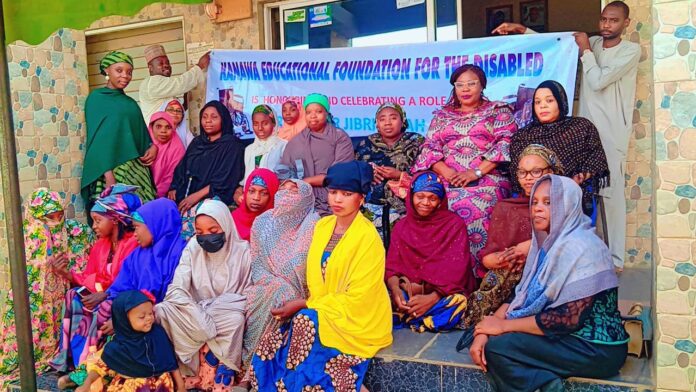In a significant move to promote menstrual hygiene and address accessibility issues for women with disabilities, the Kanawa Educational Foundation for the Disabled celebrated World Menstrual Hygiene Day with a special event dedicated to education and support. Held under the chairmanship of Usaina Umar, Project Manager of SABI Woman Kanawa, the event aimed to raise awareness about menstrual hygiene’s critical importance and advocate for greater accessibility to menstrual products.
The event kicked off with an insightful lecture on menstrual hygiene delivered by Mrs. Bridget, an expert in women’s health. She emphasized the vital role of proper menstrual hygiene in maintaining overall health and preventing infections. “Menstrual hygiene is not just a women’s issue; it’s a public health issue,” Mrs. Bridget stated. “Ensuring that women, especially those with disabilities, have access to menstrual hygiene products and education is crucial for their well-being and dignity.”
The lecture covered essential topics, including the biological aspects of menstruation, proper usage and disposal of menstrual products, and the importance of maintaining cleanliness during menstruation. Mrs. Bridget also addressed common myths and misconceptions about menstruation, encouraging the attendees to spread accurate information within their communities.
Following the educational session, the foundation distributed menstrual pads to the women in attendance. This initiative was supported by WHEELS, an organization dedicated to enhancing the lives of women with disabilities. The distribution aimed to provide immediate relief and support to the women, ensuring they have access to necessary menstrual products.
Usaina Umar, in her address, highlighted the ongoing challenges faced by women with disabilities, particularly in rural areas, regarding menstrual hygiene management. “Many women with disabilities struggle to access menstrual products due to high costs and lack of availability, especially in rural areas,” Umar noted. “This event is a step towards bridging that gap, but much more needs to be done.”
The foundation used the occasion to call on the government to subsidize menstrual pads to make them more affordable and accessible, particularly for women in rural areas. “Affordable menstrual products are a basic necessity, not a luxury,” Umar asserted. “We urge the government to implement subsidies for menstrual pads to ensure that all women, regardless of their socio-economic status or location, can manage their menstruation with dignity and without financial strain.”
The event also provided a platform for women with disabilities to share their personal experiences and challenges related to menstrual hygiene. Many participants spoke about the difficulties they face in accessing menstrual products and the impact this has on their daily lives. These personal stories underscored the urgent need for systemic changes to support menstrual health for all women.
One participant, Fatima, shared her struggle with accessing affordable menstrual products in her rural community. “I often have to choose between buying food and buying pads,” she said. “No woman should have to make that choice. Subsidizing menstrual pads would make a huge difference for women like me.”
The event concluded with a commitment from the Kanawa Educational Foundation for the Disabled to continue advocating for menstrual hygiene education and accessibility. The foundation plans to organize similar events in other communities and work with policymakers to ensure that menstrual health remains a priority.
“We are dedicated to ensuring that all women, especially those with disabilities, have the resources and knowledge they need to manage their menstrual health,” said Umar. “This event is just the beginning. We will keep pushing for change and working towards a future where menstrual hygiene is accessible to all.”
The celebration of World Menstrual Hygiene Day by the Kanawa Educational Foundation for the Disabled was a powerful reminder of the ongoing challenges faced by women with disabilities and the critical importance of advocating for their health and rights. The foundation’s efforts, supported by WHEELS and other partners, highlight the need for continued action and support to ensure menstrual hygiene is accessible and affordable for all women.


